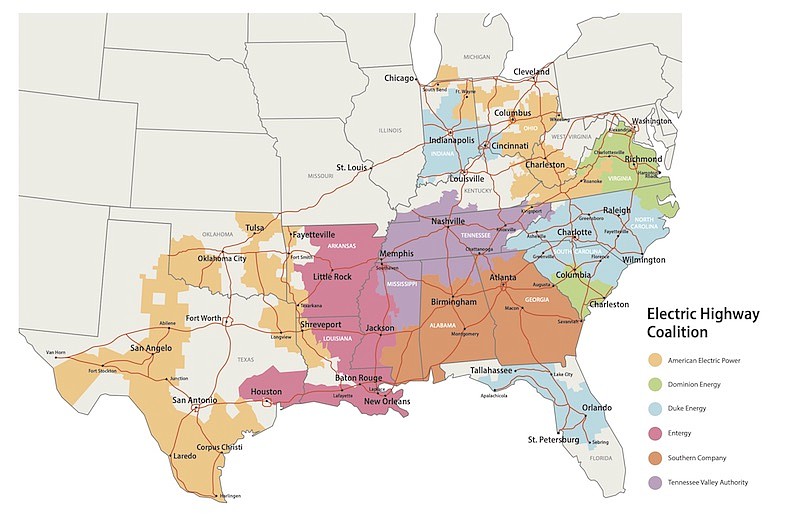Six Southern utilities are planning to develop a network of DC fast chargers to quickly recharge electric vehicles (EV) traveling along major highways from the Atlantic Coast to the Gulf and Central Plains regions.
The plan was announced Tuesday by the Electric Highway Coalition, made up of the Tennessee Valley Authority, Southern Co., Duke Energy, American Electric Power (AEP), Dominion Energy and Entergy Corp. The companies said they are each taking their own steps to provide EV charging within their service territories and will join with other networks of rapid chargers being added by EVgo in 34 states and Electrify America, which says it should have 800 charging stations with about 3,500 DC fast chargers across the country by December, including at least two cross-county routes.
"Together, we can power the electric road trip of tomorrow by ensuring seamless travel across a large region of the U.S.," TVA President Jeff Lyash said in an announcement of the new EV initiative. "This is one of many strategic partnerships that TVA is building to increase the number of electric vehicles to well over 200,000 in the Tennessee Valley by 2028."
The Edison Electric Institute estimates 18 million EVs will be on U.S. roads within the next decade. While EVs can reduce carbon emissions and provide cheaper energy to power most vehicles, many drivers remain concerned with the availability of charging stations during long road trips.
The Electric Highway Coalition is not committing to a specific number of charging stations, but utlity members said they will work to build and operate enough charging options to enable long distance EV travel along major highway routes. Charging stations will provide DC fast chargers that are capable of getting drivers back on the road in approximately 20-30 minutes.
"The path to cleaner transportation is a robust charging infrastructure along the nation's major highways," said Lang Reynolds, director of electrification strategy for Duke Energy. "Range anxiety is a barrier to more EV adoption. This coalition can erase those obstacles and help deliver the benefits of EV ownership to consumers."
In Florida, Duke Energy's Park and Plug pilot has installed more than 570 EV public charging stations throughout the state. Fifty of the 570 are fast charging stations connecting areas of Florida previously underserved by EV fast charging infrastructure. To date, drivers have used the Park and Plug network for over 60,000 charging sessions, displacing more than 90,000 gallons of gasoline.
In North Carolina, a $25 million pilot program by Duke will install 200 public Level 2 and fast charging stations, additional stations at multifamily buildings and a school bus electrification pilot that will allow school districts to change out diesel buses with electric ones.
In South Carolina, the company will provide up to a total of $1,000 for 400 residential Duke Energy Carolinas customers who install a Level 2 charging station, provide access to their charging data, and manage EV charging load to occur during off-peak periods. The company will also deploy 60 fast chargers there to expand access to fast charging infrastructure in the state.
In the Tennessee Valley, Lyash said electrifying transportation can spur the same innovative transformation that electrifying the region did back when TVA was founded in 1933 when much of Southern Appalachia was without electric service. Tennessee is already home to three major automobile assembly plants that either already or will soon be building electric vehicles for Volkswagen, General Motors and Nissan.
"EV adoption will spur jobs and economic investment in the region, keep refueling dollars in the local economy, reduce the region's largest source of carbon emissions, and save drivers and businesses money," Lyash said.
In the Tennessee Valley, TVA, the Tennessee Department of Transportation, local power companies and others have collectively pledged $40 million to support EV adoption over the next five years, including the addition of more charging stations.
"Tennessee is on the forefront of the electric vehicle revolution thanks to its robust automotive manufacturing sector, supply chain capabilities, its highly trained workforce and its commitment to developing a reliable, fast-charging network," said David Salyers, Tennessee's commissioner of Transportation.
Contact Dave Flessner dflessner@timesfreepress.com or at 423-757-6340.
